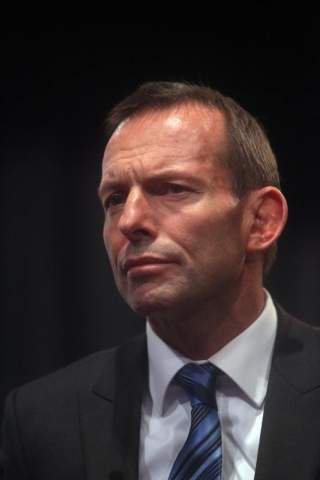Reading Burke in Sydney: Tony Abbott's Sensible Conservatism
The Tea Party could learn from the anti-ideological Australian leader.
But he is changing his thinking on international relations in subtle but crucial ways. For one thing, he appears to recognize what is emerging as a new political truism in the Antipodes: that the spectacular rise of China, now Australia’s largest trading partner, means that Canberra must learn to play a more demanding diplomatic game than ever before. Notwithstanding Abbott’s sincere admiration for America, there is a sense that he believes Australia is not faced with a stark binary choice between China and the United States. This means that Canberra, far from embracing old traits of dependability and unconditional loyalty, will need to be more nuanced, qualified and ambiguous in its diplomatic outlook.
On the eve of his election last September, Abbott appeared to recognize this reality. Under the headline “I would be an Asia-first prime minister,” he told the Sydney Morning Herald: “Decisions which impact on our national interests will be made in Jakarta, in Beijing, in Tokyo, in Seoul, as much as they will be made in Washington.”
Which brings me to another reason why Abbott has recently changed his tune on foreign policy: he appears to have been mugged by reality in the Middle East. In the aftermath of the terrorist attacks in the United States in September 2001 and Bali in 2002, Abbott became an unashamed supporter of the George W. Bush administration’s doctrine of preventive war and democracy promotion. He embraced American neoconservatism. The invasion of Iraq in 2003 was overwhelmingly unpopular among most Australians, yet Abbott and the government of Prime Minister John Howard gave strong support to Washington’s decision to topple Saddam Hussein’s regime and attempt to transform postwar Iraq into a viable state and flourishing democracy.
Over time, however, he has come to recognize that such policies are costly in terms of blood and treasure as well as credibility and prestige. In the lead-up to last September’s federal election, he took issue with then prime minister Kevin Rudd over how Australia, a member of the UN Security Council, should deal with the Syrian crisis. The Western allies, he warned, did not have a dog in this fight between “baddies.” Victory for either the Assad regime or the rebellion could mean dreadful massacres and ethnic cleansing, as well as an increased threat of terrorism if the insurgency won.
Rudd seized on Abbott’s use of the term “baddies,” slamming it as “simplistic.” “Words are bullets,” Rudd lectured, and Abbott’s failure to side with the opposition Syrian National Coalition meant that diplomats all over the globe would “scratch their heads” and “walk away in horror at this appalling error of foreign policy judgment.” In Rudd’s telling, a Prime Minister Abbott would damage Australia’s standing in the world.
But whereas Rudd was talking as if it were still 2003, it was Abbott’s more realist response to the simmering cauldron of sectarian malevolence that was more appropriate for 2013. Although no one, including Abbott, doubted the tyrannical nature of President Bashar al-Assad’s regime, it was also true that many rebels were linked to powerful and sinister groups of West-hating Islamist fundamentalists, including Al Qaeda. Meanwhile, the Obama administration was wary of entangling itself more deeply in what was becoming essentially an anti-Iranian alliance with the Sunni autocracies of the Persian Gulf that back the Syrian rebels.
The episode was revealing. Here was Rudd, widely perceived as a foreign-policy prime minister, whose hawkish pronouncements merely reflected a childish posturing in an attempt to make Australia punch above its weight. Abbott, on the other hand, merely recognized the wisdom of Talleyrand’s advice, “Above all, gentlemen, not the slightest zeal.” This was especially the case when none of the supporters of a military strike against Syria had a clear sense of the mission. Given the lessons of Iraq and Afghanistan, and since the political objective remained perilously unclear, there was much to be said for Abbott’s straight talking and foreign-policy realism.
IN POWER FOR ONLY SEVEN MONTHS, ABBOTT’S GOVERNMENT has gotten off to a rocky start. Vacillation and ineptitude over the implementation of popular education reforms, along with a deteriorating relationship with Indonesia thanks to Edward Snowden’s revelations of Australian intelligence spying on Jakarta’s political leaders in 2009 as well as displeasure with Canberra’s border-protection policy of turning back boat people to Indonesian waters, has brought to an end Abbott’s postelection honeymoon. Meanwhile, he has failed to develop the art of selling the government’s success in slashing illegal immigration, a hot-button issue in the electorate.
Already his new political opponents are confidently predicting that Abbott will be a “oncer”—a one-term prime minister. Leave aside the unintended irony here: after all, in the modern Labor Party, to serve a full term as prime minister is an extraordinary and enviable achievement given that the last two, Kevin Rudd and Julia Gillard, were dumped before either reached that particular milestone. The point here is that the critics who casually dismissed Abbott’s prospects of ever leading the nation should be more cautious about doing so again, especially so early in his term. Besides, Australian voters are a conservative lot, wary of changing parties in power after only one administration. Not since the early 1930s has a first-term government lost office.
In any case, a clear majority of Australians preferred Abbott to the widely maligned Labor Party in last year’s election. He may not be flashy and charismatic. But he is the personification of old-fashioned conservatism, representative of the unexciting virtues of prudence, continuity and measured change. It’s a lesson to which conservatives in Britain and especially America should pay close attention.
Tom Switzer is the Australian editor of the Spectator and a research associate at the United States Studies Center at the University of Sydney.
Image: Flickr/Troy Constable Photography. CC BY 2.0.

